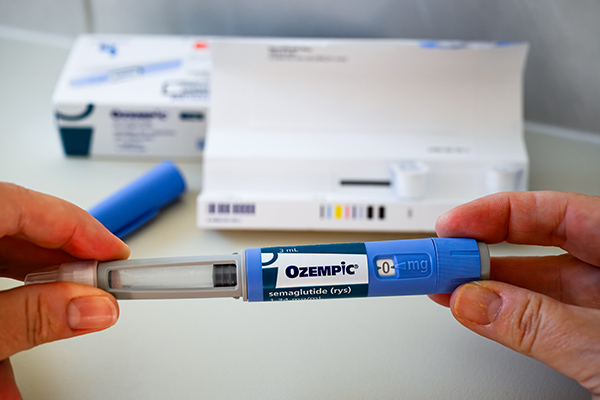Medical Weight Loss with Semaglutide (Ozempic, Wegovy)

Obesity has become one of the most pressing health challenges of the 21st century. According to the World Health Organization, over 890 million adults worldwide are living with obesity, and nearly 2 billion more are considered overweight.
For years, the typical advice was simple: eat less and move more. While those steps are still important, they often are not enough for people struggling with obesity. This condition is not just about willpower. It involves complex hormonal, metabolic, and genetic factors. For a long time, weight loss surgery was the only option that showed lasting results.
That changed with the introduction of semaglutide, the medication found in Ozempic and Wegovy. Originally created to treat type 2 diabetes, semaglutide turned out to have an unexpected and powerful benefit. In clinical studies, people taking semaglutide lost as much as 15% to 20% of their body weight with consistent use. And they did it without surgery.
Semaglutide Treatment at Buckhead Clinic
Semaglutide has proven to be a powerful tool for weight loss, but it affects many systems in the body. That’s why it should always be used under the care of a qualified medical provider.
At Buckhead Primary Care, we take a gradual and personalized approach to treatment. Your doctor will carefully track your progress, adjust your dosage as needed, monitor lab results, and check in regularly on your overall well-being. This level of supervision helps minimize side effects and leads to more stable, long-term results.
Our medical weight loss program goes beyond simply prescribing medication. We work closely with you throughout the entire process, discussing nutrition, physical activity, and lifestyle habits that support lasting success.
Modern Weight Loss Medications, Guided by Doctors
As we approach 2026, the most effective treatments for obesity focus on regulating appetite hormones and improving metabolic function. Below is a comparison of the most well-studied medications available today, including how they work, what results they offer, and what sets them apart.
Comparison of Leading Weight Loss Medications as of November 2025
| Medication (Brand) | Type / Form | Average Weight Loss in Studies | How It Works | Main Benefits | Main Drawbacks |
|---|---|---|---|---|---|
| Semaglutide (Ozempic, Wegovy) | Weekly injection; oral form awaiting FDA approval | 15–20 percent body weight in 1 year | Reduces appetite, slows stomach emptying | High effectiveness; proven reduction of cardiovascular risk | High cost (~1300 USD/month), possible nausea, muscle loss without exercise |
| Tirzepatide (Mounjaro, Zepbound) | Weekly injection | Up to 22 percent body weight | Targets two hormones — GLP-1 and GIP | Stronger effect compared to GLP-1 monotherapy | Nausea, high cost, possible limited availability |
| Oral Semaglutide (Wegovy Pill) | Daily tablet (awaiting FDA approval) | 16.6 percent weight loss in 64 weeks | Works the same as injectable semaglutide | No injections, convenient daily use | Mild GI side effects (nausea, bloating) |
| Phentermine / Topiramate (Qsymia) | Daily tablet | 8–10 percent weight loss | Suppresses appetite, increases energy expenditure | Cheaper than GLP-1 drugs, available as generics | CNS side effects (insomnia, anxiety), contraindicated in hypertension |
| Naltrexone / Bupropion (Contrave) | Daily tablet | 5–9 percent weight loss | Affects pleasure and appetite centers in the brain | Useful for emotional eating | Possible increase in blood pressure and insomnia |
| Retatrutide (Retatrutide) | Weekly injection (in clinical trials) | Up to 24 percent weight loss | Triple action on GLP-1, GIP, and glucagon receptors | Potentially the most powerful medication on the market | Still in trials; not FDA approved |
| MariTide (Eli Lilly) | Monthly injection (Phase 3 trials) | Data pending | Combined agonist, convenient dosing schedule | Less frequent injections | Not FDA approved; effectiveness still under study |
Side Effects of Semaglutide and Other GLP-1 Medications: What to Expect

People respond differently to GLP-1 medications, and some side effects are more common than others. Below are the reactions patients most often report during treatment.
Digestive Issues
Stomach-related side effects are the most common, especially during the first few weeks of therapy. Some people experience nausea, bloating, diarrhea, constipation, heartburn, or mild vomiting. In most cases, these symptoms improve as the body adjusts to the medication.
If the discomfort lasts longer than a few weeks, your doctor may lower the dose or temporarily pause the treatment to help your system adapt more gradually.
In some cases, semaglutide can slow down the digestive process. This condition is known as gastroparesis, and while it is rare, it can cause a lingering feeling of fullness, heaviness, or nausea after eating. People with naturally slow digestion or those living with diabetic neuropathy may need a more customized treatment plan.
How GLP-1 Medications May Affect the Thyroid
In early animal studies, GLP-1 drugs were linked to increased thyroid activity. Later research in humans showed a slight rise in the risk of developing a rare form of thyroid cancer called medullary thyroid cancer.
To keep things in perspective, this type of cancer is extremely rare. The estimated risk without treatment is 0.0005 percent, and with GLP-1 medications, it rises only slightly to 0.0008 percent.
Even though the numbers are very low, it is important to talk with your doctor before starting treatment. If you or a close relative has had thyroid cancer, your provider can help you weigh the risks and choose the safest option.
Why You Should Only Use FDA-Approved Semaglutide
There have been reports of serious complications from people using semaglutide incorrectly or buying it from unreliable sources. Some patients ended up in the hospital after injecting counterfeit or improperly mixed versions of the drug.
To stay safe, only use semaglutide that comes from a licensed pharmacy and has been prescribed by a medical provider. Do not try to adjust the dose on your own. Follow your doctor’s instructions exactly.
Caution for People with a History of Eating Disorders
GLP-1 medications lower appetite, which can be helpful for weight loss. But in people with a history of eating disorders, this effect can become risky.
If your calorie intake drops too low, it can lead to fatigue, muscle loss, dehydration, kidney strain, and emotional changes. If you’ve struggled with anorexia, bulimia, or binge eating in the past, talk to your doctor. You may still be a candidate for treatment, but it should be done with close medical supervision and additional support.
Cost, Insurance, and Availability: What to Know Before You Begin
Semaglutide is a prescription medication, and in the United States, the average cost of treatment is about 1,300 dollars per month without insurance. Some insurance plans help cover the expense, but coverage can be inconsistent, especially when the drug is used for weight loss rather than diabetes.
Because demand for semaglutide has surged in recent years, temporary shortages do happen. Unregulated versions and counterfeits have also appeared, especially through online sources and unauthorized clinics. To stay safe, only use medication that comes from a licensed pharmacy and has been prescribed by a qualified healthcare provider.
Semaglutide Supports More Than Just Weight Loss
While semaglutide is best known for helping with weight management, research shows it may offer additional health benefits.
In people with type 2 diabetes, GLP-1 medications have been shown to lower the risk of heart disease and reduce overall mortality by about 11 percent. Some studies suggest they may also improve liver health in people with nonalcoholic fatty liver disease.
There is early evidence that these medications may help protect brain function and reduce the risk of cognitive decline, including conditions like Alzheimer’s disease. For people without diabetes, more research is still needed, but the results so far are encouraging.
Who May Be a Good Candidate for GLP-1 Medications
The FDA has approved Wegovy, a form of semaglutide, for weight loss in adults who meet one of the following criteria:
- A body mass index (BMI) of 30 or higher.
- A BMI of 27 or higher along with a weight-related health condition, such as type 2 diabetes, high blood pressure, or high cholesterol.
Before starting treatment, your doctor will review your medical history, lab results, and any medications you are currently taking to ensure that semaglutide is safe and appropriate for you.
When Extra Caution Is Needed
GLP-1 medications are not recommended for everyone. In certain cases, they may increase the risk of complications. You should talk with your doctor if any of the following apply to you:
- You have a personal or family history of thyroid cancer, especially medullary thyroid carcinoma.
- You have been diagnosed with multiple endocrine neoplasia type 2, a rare genetic condition linked to endocrine tumors.
- You have had pancreatitis. Because semaglutide can affect the pancreas, people with a history of inflammation may be at higher risk of flare-ups.
- You have gallbladder problems, such as gallstones or inflammation. Rapid weight loss can thicken bile, which may increase the chance of developing new stones.
If any of these conditions are present, your doctor may recommend an alternative approach or adjust your treatment plan to reduce risk.
How Long Do You Need to Take Semaglutide?
Semaglutide is not a quick fix. It is a long-term tool designed to help manage weight over time. Like high blood pressure or type 2 diabetes, obesity is a chronic condition. That means it requires consistent medical support and long-term lifestyle changes, not just short-term treatment.
As Dr. Adrienne Youdim, a physician and weight loss specialist in Beverly Hills, explains, stopping the medication usually leads to a gradual return of appetite. Without continued support, many people begin to regain weight. In fact, studies show that within a year of stopping semaglutide, patients may regain up to two thirds of the weight they originally lost if they do not maintain healthy habits.
For this reason, there is no one-size-fits-all answer to how long treatment should last. Some people stay on semaglutide as part of a long-term care plan. Others may use it for a shorter period to reset their metabolism, build healthier routines, and work toward lasting change with medical guidance.
The Story Behind Semaglutide: From Discovery to Breakthrough
These days, medications like Ozempic and Wegovy are everywhere — in the news, on social media, and in everyday conversations between doctors and patients. While they are helping millions lose weight, they also raise questions about side effects, long-term use, and who they are right for.
It all began in the 1980s, when researchers discovered a hormone in the human body called GLP-1. It is released in the gut after eating and plays an important role in regulating blood sugar and appetite. The problem was that natural GLP-1 breaks down in the body within just a few minutes, making it impractical as a treatment.
The first major breakthrough came from an unlikely source — a venomous desert lizard called the Gila monster. Scientists found a compound in its saliva that mimicked GLP-1 and lasted longer in the body. This led to the development of exenatide, which was approved by the FDA in 2005 to treat type 2 diabetes. For the first time, doctors had a way to harness the power of GLP-1 in humans.
Building on that discovery, researchers worked to create a longer-acting version of the hormone. The result was semaglutide, a molecule designed to stay active in the body for several days. A single weekly injection was all it took. In 2017, the FDA approved semaglutide under the name Ozempic to help manage blood sugar in people with type 2 diabetes. A few years later, in 2021, Wegovy was approved specifically for weight loss.
As clinical trials continued, the benefits of semaglutide became even more clear. A large study known as SELECT found that semaglutide not only helped with weight loss, but also reduced the risk of serious heart problems in people with obesity. In 2024, the FDA officially expanded Wegovy’s label to include heart protection for adults with obesity and cardiovascular disease.
That same year, a new generation of medications entered the scene. One of them, tirzepatide, works by targeting two hormones instead of one. In 2023, the FDA approved it under the name Zepbound for weight loss. By 2024, it had also been approved for treating obstructive sleep apnea in people with obesity. Studies show that tirzepatide may lead to even greater weight loss than GLP-1 medications alone.
Researchers have also been developing new ways to take these medications. In 2019, the FDA approved the first oral form of semaglutide, called Rybelsus, for treating diabetes. A version for weight management is now in the final stages of review.
Looking ahead, drug companies are working on options that require fewer injections. One promising candidate is MariTide, a once-a-month shot that may offer a more convenient way to manage obesity. It is currently being tested in late-stage clinical trials.
Final Thoughts
Semaglutide is one of the most important medical breakthroughs in recent years. It has helped millions of people not only lose weight but also lower their risk of serious health conditions, including heart disease and diabetes. Some experts believe this class of medications could one day be recognized with a Nobel Prize.
Still, it is important to remember that semaglutide is not a quick fix. It is a prescription medication that should be taken seriously and only under the care of a qualified medical provider. Following advice from blogs or social media can lead to unwanted side effects or unsafe outcomes. A doctor can evaluate your health, determine if semaglutide is right for you, and guide you safely through treatment.
At Buckhead Primary Care, we offer medically supervised weight loss plans built around your unique needs. Your doctor will monitor your progress, adjust your dosage when needed, and support you every step of the way.
Ready to take the next step? Schedule a consultation to learn whether semaglutide is right for you and how to make your weight loss journey safe, effective, and sustainable.
